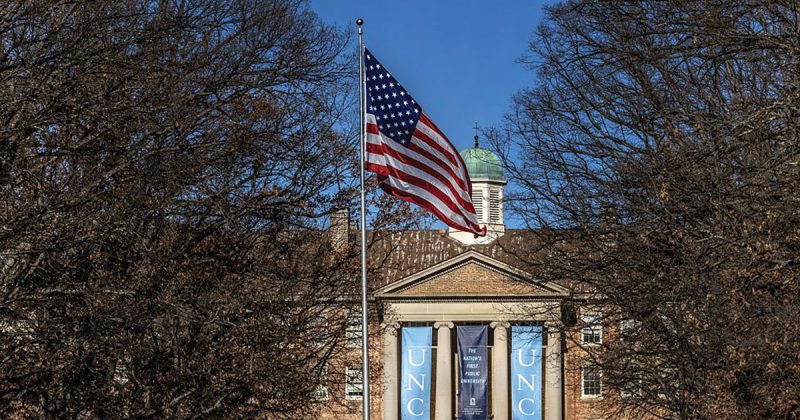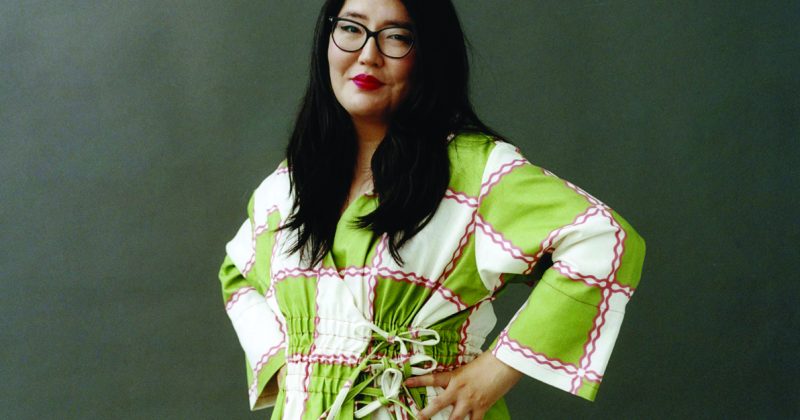
Zack Hall’s research uses a computational method to help answer questions about the basic building blocks of matter. (photo by Donn Young)
Ph.D. student Zack Hall has made an impact at Carolina through his research of subatomic particles and by supporting undergraduate physicists.
“From a very early age, I had questions about everything,” Zack Hall remembered.
Those questions were often rooted in the natural world. Why is the sky blue? What is electricity? How do we understand the movement of objects?
But it wasn’t until a high school science class that he realized all his questions could be studied through the lens of a singular field.
“I was like, ‘This is physics?’” Hall said with a laugh. His curiosity had found a home.
His studies led him to the Georgia Institute of Technology for a B.S. in physics and mechanical engineering and to California State University, Long Beach, for an M.S. in physics. His research at both universities focused on different aspects of astrophysics — black holes and neutron stars, respectively — and he planned to continue that trajectory when he began his Ph.D. at Carolina in 2017.
“But when I got to UNC, the professor I wanted to work with wasn’t taking on any students,” Hall said.
That twist of fate led Hall to the “completely opposite side” of physics, from studying some of the largest objects in the universe to researching subatomic particles in UNC physicist Amy Nicholson’s research group.
Nicholson’s focus is on quantum chromodynamics, or QCD, a subject in theoretical physics that delves into the interactions of the fundamental building blocks of matter: quarks and gluons.
“The question is, how do the interactions between these quarks and gluons come together to form protons and neutrons?” explained Hall.
To help answer this question, the Nicholson group uses a technique called lattice QCD, which rewrites equations that are impossible to solve by hand so that they are interpretable by computational techniques. Supercomputers are then able to run simulations that can be compared to experimental results from the lab.
Hall’s proposal to research how lattice QCD might be able to integrate electromagnetic interactions into simulations of the nucleon axial coupling — which has yet to be accomplished by anyone in his field — earned him a 2022 U.S. Department of Energy Office of Science Graduate Student Research award. He spent 2023 working at the Lawrence Berkeley National Laboratory in California.
At that facility, Hall was grateful for the opportunity to learn from visiting scholars and to work side-by-side with his collaborator and mentor, staff scientist André Walker-Loud. After graduation this spring, Hall will return in a postdoctoral position.
At Carolina, he is helping undergraduate students in physics establish their voices and place in the discipline through the Graduate-to-Undergraduate (G2U) Mentoring Program he co-founded. For Hall, a Black scientist, the idea began in the summer of 2020.
“The death of George Floyd resonated with me in such an unexpected way,” he said. “Amidst the racial reckoning the country was undergoing, I briefly thought about leaving my Ph.D.”
Hall wondered if the only way to make a difference was to find a new field. But a fellow UNC physicist changed his mind.
“I reached out to Professor Sheila Kannappan, and she reminded me, ‘You’re still needed here in academia, and there are things that you can do,’” he said.
Together, Hall, Kannappan and teaching associate professor Jennifer Weinberg-Wolf created a program that was backed by findings from the American Institute of Physics and supported with funding from the College of Arts and Sciences.
The findings emphasized the importance of creating a sense of belongingness and instilling a sense of “physics identity” in all of its undergraduate students.
After graduation, Hall plans to stay involved in an advisory role. He’s proud of the support the program has provided to undergraduate students, but emphasizes that growth happens for the graduate mentors, too.
“Having these interactions with the mentees allows me to broaden my own perspective,” he said. He’ll take that with him to Berkeley and beyond.
By Jess Abel ’19
Published in the Spring 2024 issue | Student Up Close, Tar Heels Up Close
Read More

Carolina Asia Center trains Fort Liberty soldiers
UNC faculty provide soldiers meaningful expertise in Asian language, culture…

Cozy up to a good read: More books from College faculty and alumni
In addition to our Chapter & Verse feature poem, enjoy…


